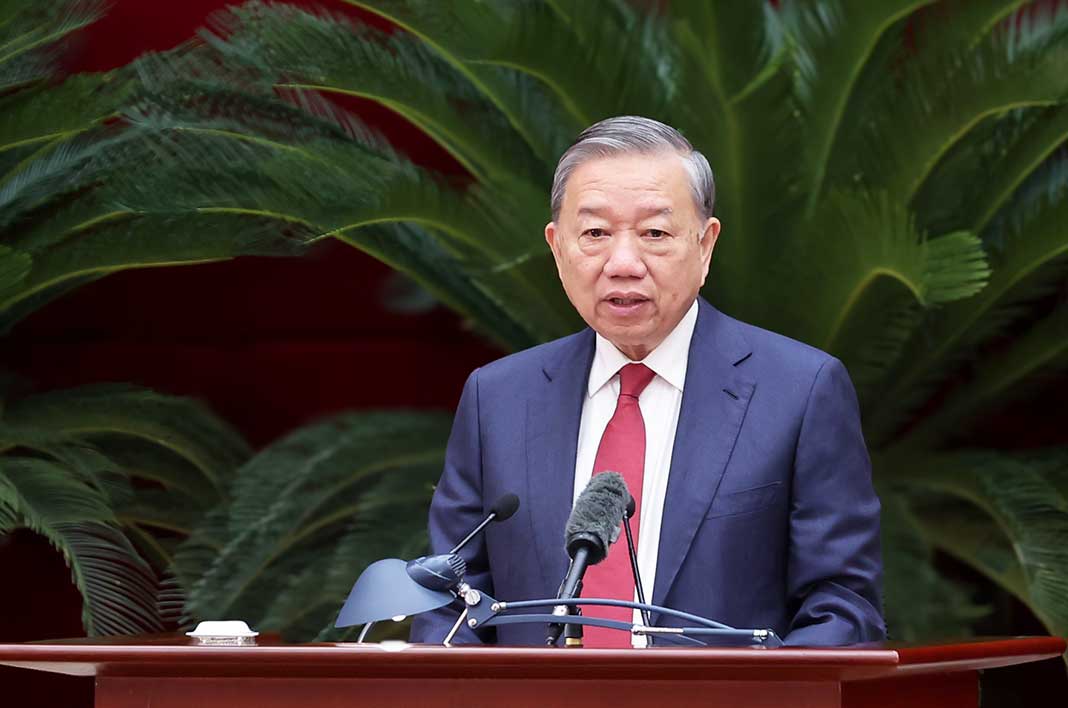HCMC – The 14th plenum of the 13th Party Central Committee conducted procedures on its first working day today to nominate candidates for the Politburo and the Secretariat for the 14th tenure, including both reelections and new elections.
According to a press release from the Office of the Party Central Committee issued on the afternoon of November 5, the committee convened in the morning session, during which Party General Secretary To Lam delivered his opening remarks and State President Luong Cuong chaired the meeting.
The committee then carried out steps to nominate candidates for the Politburo and Secretariat in the next tenure.
In the afternoon, the committee continued its agenda on personnel affairs, nominating members of the presidium, secretaries and the credentials verification committee for the 14th National Congress of the Communist Party of Vietnam.
Delegates also held group discussions on several key documents, including the draft report reviewing the leadership and direction of the 13th-tenure Party Central Committee; the draft review report on the implementation of the working regulations of the Party Central Committee, the Politburo, the Secretariat, and the Central Inspection Commission; and the report reviewing the implementation of Resolution 18 on streamlining and enhancing the efficiency of the political system’s organizational structure.
The committee elected Tran Sy Thanh as head of the Central Inspection Commission and conducted procedures to nominate candidates for several senior positions, including vice chairpersons of the 15th National Assembly and chief justice of the Supreme People’s Court for the 2021–2026 term, for the Politburo to recommend to the National Assembly for election in accordance with regulations.
In his opening remarks, Party General Secretary To Lam stressed that nominating candidates for the 14th-tenure Politburo and Secretariat is an exceptionally crucial task—“the core of the core”—as all matters ultimately depend on people.
He underscored that the selection of top Party leaders, who will steer the nation toward ambitious development goals in the new era, must be carried out with great care, prudence, and precision.
He called for the nomination of the most deserving individuals—those with strong political will, integrity, exemplary conduct, and an unwavering commitment to placing national, ethnic, and public interests above all else. He emphasized that candidates must possess strategic vision and organizational capacity to remove bottlenecks, unlock resources, and rally collective strength. More importantly, they must demonstrate execution capability—designing clear goals, defining personal accountability, applying data-based evaluation, and ensuring decisive policy implementation with high public service discipline, he noted.
In the digital era, To Lam said, essential qualifications include digital competence, data literacy, deep understanding of the digital economy, green economy, and circular economy, as well as skills in risk management and intersectoral coordination. Leaders must be able to mobilize social resources, design effective public-private partnerships, build market confidence, and engage internationally through proficiency in foreign languages and cross-cultural dialogue.
He said priority should go to officials who have delivered measurable impacts through their projects or initiatives, demonstrated crisis management capabilities—whether in natural disasters, epidemics, finance, or unconventional security—and shown decisiveness while remaining receptive to feedback and rooted in the public.
Those nominated, he said, must be the most suitable figures for the country’s new development phase—trusted, resilient under pressure, reform-minded, and capable of converting potential into momentum for double-digit growth, propelling the nation toward its two centennial goals.
He added that, beyond the general criteria set by Party regulations, special attention should be given to five pluses: 1) Strategic national vision and ability to safeguard independence and autonomy; 2) Proven leadership and command capacity at the national level; 3) Symbolic political integrity and moral standing that inspire public trust; 4) Capability to translate Party resolutions into measurable outcomes; and 5) Mental and physical endurance to handle the intensity and pressures of the 14th tenure and beyond.









